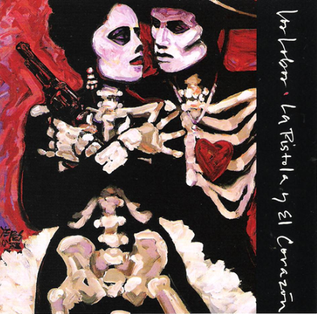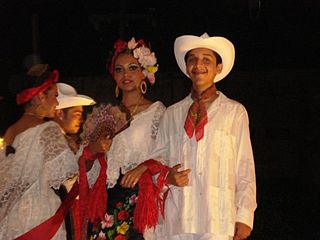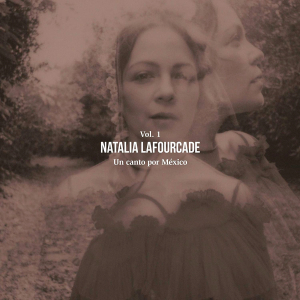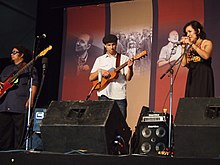The term conjunto refers to several types of small musical ensembles present in different Latin American musical traditions, mainly in Mexico and Cuba. While Mexican conjuntos play styles such as norteño and tejano, Cuban conjuntos specialize in the son, as well as its derivations such as salsa.

Chicano rock, also called chicano fusion, is rock music performed by Mexican American (Chicano) groups or music with themes derived from Chicano culture. Chicano Rock, to a great extent, does not refer to any single style or approach. Some of these groups do not sing in Spanish at all, or use many specific Latin instruments or sounds. The subgenre is defined by the ethnicity of its performers, and as a result covers a wide range of approaches.
"La Bamba" is a Mexican folk song, originally from the state of Veracruz, also known as "La Bomba". The song is best known from a 1958 adaptation by Ritchie Valens, a Top 40 hit in the U.S. charts. Valens's version is ranked number 345 on Rolling Stone magazine′s list of the 500 Greatest Songs of All Time.

La Pistola y El Corazón is the fourth album by the Mexican American rock group Los Lobos, released in September 1988 on Slash/Warner Bros. Records. The mini-album is dedicated to Tejano/Mariachi folk music. It won a Grammy Award in 1989 for Best Mexican-American Performance.

Son jarocho is a regional folk musical style of Mexican Son from Veracruz, a Mexican state along the Gulf of Mexico. It evolved over the last two and a half centuries along the coastal portions of southern Tamaulipas state and Veracruz state, hence the term jarocho, a colloquial term for people or things from the port city of Veracruz.

Son huasteco is one of eight Mexican song styles and is a traditional Mexican musical style originating in the six state area of Northeastern Mexico called La Huasteca. It dates back to the end of the 19th century and is influenced by Spanish and indigenous cultures. Usually it is played by a Trio Huasteco composed of a guitarra quinta huapanguera a Jarana huasteca and a violin. Singers will often use the falsetto register. The son huasteco is particularly noteworthy for its flamboyant and virtuoso violin parts, although the style varies from state to state. Footwork often danced to son huasteco is the Zapateado. Improvisation plays a strong role in the style, with musicians creating their own lyrics and arrangements to a standard repertoire. Typical sones huastecos are "Cielito Lindo", "La huazanga", "La sirena", "El querreque" and "La cigarra".

In Mexican Spanish, Jarocho is a colloquial demonym for residents of the State of Veracruz, Mexico, as well as an appellative term for anything related to said state.

Crow Jane Alley is an album by Willy DeVille. It was recorded in 2004 in Los Angeles. For this album, DeVille was joined by members of the Chicano rock band Quetzal, David Hidalgo of Los Lobos, and Peruvian Afro-Cuban jazz drummer Alex Acuña, among other prominent musicians. Crow Jane Alley was produced by John Philip Shenale, the third album Shenale produced for DeVille.

Los Cenzontles is a Mexican-American group, cultural arts academy, and media production studio, that promotes Mexican roots music through research, performance, education, musical recordings and videos. They are based in the working-class city of San Pablo, California where they form the core of Los Cenzontles Cultural Arts Academy, where the members of the group were trained. Los Cenzontles have revived and promoted little known styles of Mexican regional music since 1989. The group has collaborated with numerous artists that include David Hidalgo, Linda Ronstadt, Los Lobos, Ry Cooder, Taj Mahal, Jackson Browne, The Chieftains and Flaco Jimenez, among others. Los Cenzontles has produced 30 tradition-based and cross cultural albums, 4 documentaries, and hundreds of video shorts available on their YouTube channel.
Son de Madera is a son jarocho band based in Veracruz, Mexico. Its core members are Ramón Gutiérrez Hernández, Tereso Vega, and Rubí Oseguera Rueda. The band was founded in 1992 by Ramón Gutiérrez and Laura Rebolloso.
Son de Montón is a Mexican band founded in 2004 in Guanajuato, which fuses Mexican traditional music, especially son music and other musical styles with a purpose of bringing traditional music to younger audiences. The members are Ignacio Piñón Pérez, who plays violin, a guitar called a jarana and quijada, Anatolij Tkatschinski Pérez who plays jarana and quijada, Eduardo Vallejo Torres who plays percussion, Antonio López Cardons who plays jarana and harmonica, Fernanda Aldonza López Cardona, Primo Lara Stephens, Luis Jesús Cibrian García, José Abraham Morales Salazar and sound technician Jacob Sinuee Segoviano Alonzo. Its members come from Veracruz, Sinaloa, Chihuahua and Guanajuato, but the band is based in Guanajuato.

Son mexicano is a style of Mexican folk music and dance that encompasses various regional genres, all of which are called son. The term son literally means "sound" in Spanish, and is also applied to other unrelated genres, most notably son cubano.
Las Cafeteras is a Chicano band from East Los Angeles, California. Their music fuses spoken word and folk music, with traditional Son jarocho and zapateado dancing.
Cambalache is a Son Jarocho band based in East Los Angeles, California. They are the one of key bands at the center of the son jarocho explosion in Los Angeles in 2010s.

Martha Gonzalez is a Chicana artist, activist, musician and feminist music theorist. She is an associate professor in the Intercollegiate Department of Chicana/o Latina/o Studies at Scripps College. She is also a lead singer, percussionist, and songwriter for the band Quetzal, which won a Grammy Award for Best Latin Pop, Rock or Album in 2013. In 2022, Gonzalez was named a MacArthur Fellow by the MacArthur Foundation.
Patricia Zavella is an anthropologist and professor at the University of California, Santa Cruz in the Latin American and Latino Studies department. She has spent a career advancing Latina and Chicana feminism through her scholarship, teaching, and activism. She was president of the Association of Latina and Latino Anthropologists and has served on the executive board of the American Anthropological Association. In 2016, Zavella received the American Anthropological Association's award from the Committee on Gender Equity in Anthropology to recognize her career studying gender discrimination. The awards committee said Zavella’s career accomplishments advancing the status of women, and especially Latina and Chicana women have been exceptional. She has made critical contributions to understanding how gender, race, nation, and class intersect in specific contexts through her scholarship, teaching, advocacy, and mentorship. Zavella’s research focuses on migration, gender and health in Latina/o communities, Latino families in transition, feminist studies, and ethnographic research methods. She has worked on many collaborative projects, including an ongoing partnership with Xóchitl Castañeda where she wrote four articles some were in English and others in Spanish. The Society for the Anthropology of North America awarded Zavella the Distinguished Career Achievement in the Critical Study of North America Award in the year 2010. She has published many books including, most recently, "I'm Neither Here Nor There, Mexicans"Quotidian Struggles with Migration and Poverty, which focuses on working class Mexican Americans struggle for agency and identity in Santa Cruz County.

Emma Pérez is an American author and professor, known for her work in queer Chicana feminist studies.
Son Armado is a Mexican-American cultural organization dedicated to the proliferation of the Son Jarocho Fandango, an education-based art form that revolves around celebrations and community gatherings known as Fandangos. Son Armado is based in Austin, Texas.

Un Canto por México, Vol. 1, is the eighth studio album by Mexican recording artist Natalia Lafourcade, based on a concert made on November 4, 2019 called Un canto por México para la reconstrucción del Centro de Documentación del Son Jarocho. It was released on May 8, 2020.
Nobuko JoAnne Miyamoto is a Japanese American folk singer, songwriter, author, and activist in the Asian American Movement. She was a member of the band Yellow Pearl along with Chris Kando Iijima and Charlie Chin. They are known for co-creating the 1973 folk album A Grain of Sand: Music for the Struggle by Asians in America. This album is considered the first Asian-American album in history. She was a member of the band Warriors of the Rainbow during the late 1970s.










